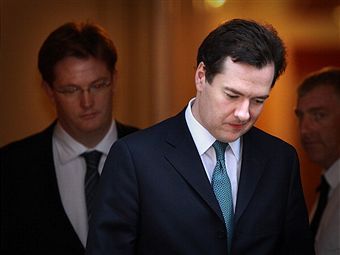 In today’s spending review, George Osborne was absolutely right to hold the line
on eliminating the structural deficit within one parliamentary term. In the Emergency Budget released earlier this year the coalition won fiscal credibility (and breathing space from international
financial markets) by setting that goal. Failing to follow through on this goal at the first sign of difficulty would have damaged the government’s credibility and reputation in the eyes of
international markets.
In today’s spending review, George Osborne was absolutely right to hold the line
on eliminating the structural deficit within one parliamentary term. In the Emergency Budget released earlier this year the coalition won fiscal credibility (and breathing space from international
financial markets) by setting that goal. Failing to follow through on this goal at the first sign of difficulty would have damaged the government’s credibility and reputation in the eyes of
international markets.
The Chancellor was also absolutely right to highlight the need for public service reform and to look to the welfare budget to provide some large and early savings. The government spends more on
welfare than on anything else and savings in this budget can be made relatively quickly.
In spite of this there is still a nagging concern that the coalition is “doing the right things but in the wrong way”. A number of the key departmental budgets – health, schools,
aid, science and pensions in effect – are still ring-fenced. This will isolate these services from incentives to provide value for money and undermine the case for reforming them to be
affordable in the 21st century.
On welfare reform, key initiatives included reforming the Employment and Support Allowance, controlling the cost of tax credits and capping the amount a workless household can receive in benefits.
While these may be sensible reforms, the impression they give is of a government squeezing the pips dry on out of work benefits, while the worst value welfare spending is left largely
unreformed.
A key area for making savings in the welfare budget should be universal benefits. As Reform argued last week, the coalition has, correctly, accepted the
need to means-test the child benefit, but it is doing so in a complex and unfair way. It has also failed to grasp the nettle on the universal gimmicks paid to pensioners, which are expensive and
provide extremely poor value for money.
By failing to seriously cut spending on universal welfare benefits, the Government has left itself open to the charge that it is picking on poorer families while leaving wealthier families
untouched. This lack of consistency may prove to undermine the whole process of reform.
On public service reform, there is also cause for concern. The radical and brave reforms to police accountability go ahead but so do the wrong-headed proposals on the NHS and the limits to
education reform. The review makes clear that the most radical reform ideas, such as personal budgets, will be reserved for very specific and relatively small budgets (such as “special
educational needs” and “support for children with disabilities”). Similarly the strongest proposals on opening up public service provision lie in limited areas such as
“court and tribunal services” and “early interventions for the neediest families”. The arguments for consumer choice used in the Blair years are absent from this
spending review.
Patrick Nolan is Chief Economist at Reform.






Comments